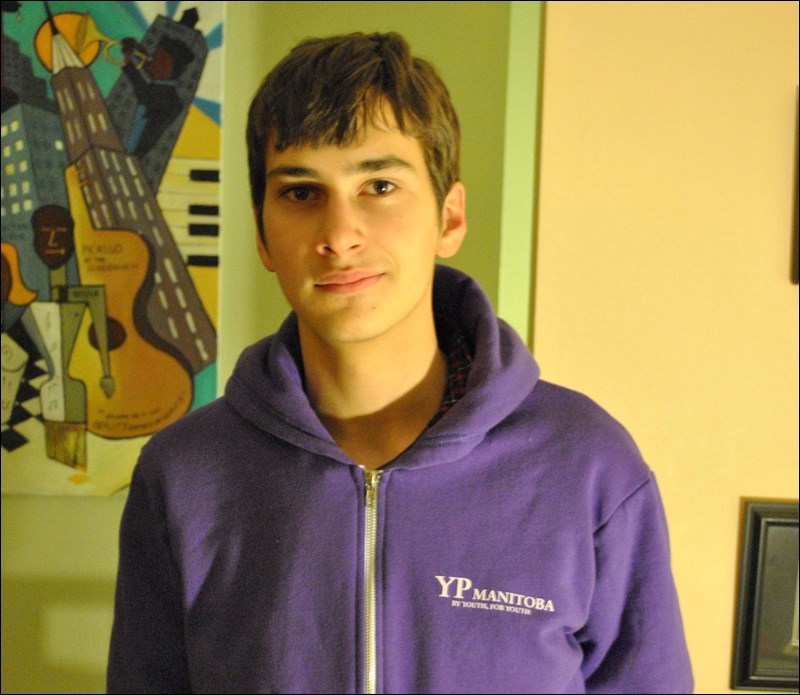While many of us were sitting back and enjoying the respite that comes after a busy holiday schedule, a group of over 60 young adults assembled at the provincial legislature to participate in the Youth Parliament of Manitoba.
This year Hapnot Collegiate student
Brandon Kolt attended the annual event from December 26 to 31.
The Youth Parliament of Manitoba, or YPM, is an opportunity for young men and women, aged 16 to 21, from across the province to participate in a simulation of the Government of Canada’s regular parliamentary sessions.
Each member of the event is given a region of Canada to represent, as well as six mock government bills to study and debate while in session.
The program takes place within the actual chambers of the Manitoba legislature, offering participants the opportunity to sit in the very seats from which our own MLAs debate the issues year-round.
This was Kolt’s first year with the program, and he had little idea what to expect.
“On the first day, I was scared, just terrified of speaking,” he said. “But after my first speech, everything was exciting, thrilling – I really liked the debating process, it was formal, honourable, and we could be passionate.”
Kolt found talking to the Speaker to be more challenging than expected. The formalities of remembering to thank him, speak only to him and to be articulate and careful with one’s words could be difficult.
“If you’re offending someone else, you’re offending the Speaker, and that’s a no-no.” Kolt quipped with a smile, “But one of the things I love about YPM, and that other people adore about it, is the fact that it’s an opportunity to be vulnerable, the opportunity to let your ideas flourish and have your voice represented in the House.”
The quality and amount of ideas and conversation energized him as well.
“It’s a different atmosphere from school and the general public. Everyone has these ideas and you would have conversations where someone would say, ‘Hey, I want to speak my mind for a bit.’ And then you’d have everyone chiming in to talk about his or her beliefs and say everything that could be said about the topic. Our conversations lasted a long time. You could be walking from the legislature, have lunch, and only just finish the conversation when you got back.”
YPM begins its session with an opening ceremony, complete with a bagpiper and colour party, and proceeds with the entrance of the Speaker and the ceremonial mace that represents the Queen’s authority and presence.
The members of the session are instructed in the proper procedures and courtesies involved in parliamentary debate, including answering and posing questions to the Speaker rather than to a particular member or minister, and bowing at certain points to the mace in the centre of the chambers on the way into and out of their seats.
The program follows the proper methods of discussing and deciding for or against bills, completing first, second and third readings for each, including question period. It also offers opportunities for workshops with experienced politicians.
The members had a tremendous chance to speak out about their ideas and opinions, to lean on one another during question period and to form their own private members’ bills in the evenings, which they spent together at a nearby school.
While the format was serious, Kolt learned there was more than enough fun to be had.
“One of the fun things about YPM was question period. You could use it for serious debate, where a member asks the minister about a particular section in the bill and what that means, but a lot of people used question period to make jokes, all while using parliamentary etiquette.”
One day one of the ministers and Kolt dressed exactly alike. During question period Kolt left the room and when he came back, the minister was gossiping to the entire house about how Kolt looked exactly like him, to an “almost tacky degree.”
Kolt immediately called him out on the question and asked him if he was “so original.”
Clearly Kolt enjoyed his experience, and he encourages anyone to try to attend or at least watch one of the sessions from the gallery.
“It’s more important than people may make it out to be. It’s the next generation talking about how they think politics should be done. When you have all of those kids debating in the House like that, it’s interesting to take it all in and say to yourself that one of these people in the room could be our future leader.”




